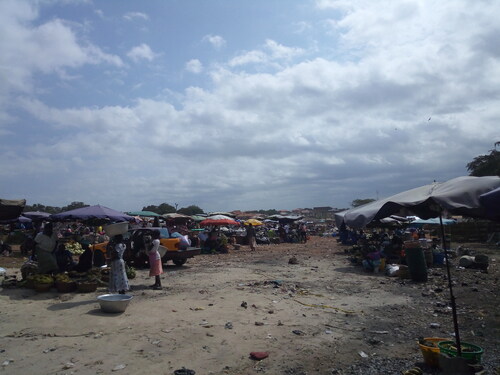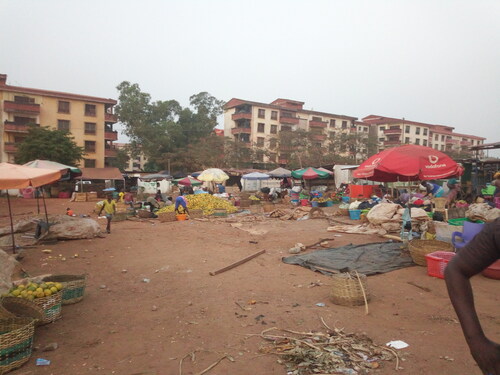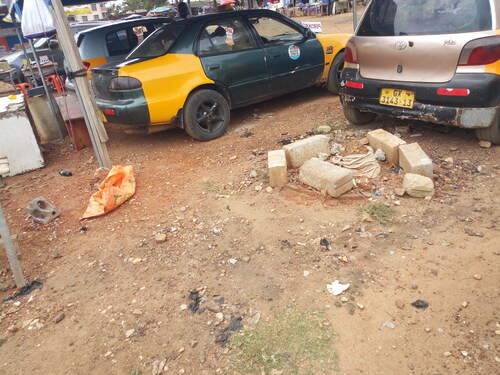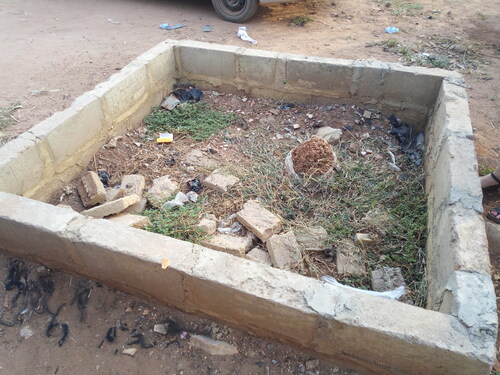This essay deals with the La (Ga) indigenous religious ritual of planting a traditional deity in a newly established marketplace in Madina, a peri-urban and a multireligious area in Accra, Ghana. The relation of this deity to the market is to ensure peaceful coexistence between traders as well as protection of the marketplace. The La people are inhabitants of one of the six independent towns that constitute the Ga ethnic group. The principal town of the La people is Labadi (La), and Madina is built on La traditional land. Madina is a multireligious and multiethnic neighbourhood, with Muslims, Christians and Traditionalists. While African traditional religious practices are pushed to the margins, they still play a central, albeit often overlooked, role regarding land issues.
The Jamaica Marketplace
The Bohye International Market, otherwise known as the Jamaica Market was inaugurated in November 2018 following the forceful displacement of the initial occupants on the space ( and ). These occupants, a group of people similar to what Loic Wacquant (Citation2007) describes as “urban outcasts,” were said to have desecrated the space through their everyday activities. These activities included prostitution, drug peddling, alcoholism, robbery, and abortion. The group consisted of ethnically, religiously and nationally diverse people from Ghana, Togo, Burkina Faso, Liberia, and Ivory Coast. The Jamaica area was tagged by the municipal authorities as a criminal den that was full of depravity, lasciviousness, and other forms of moral turpitude. In the same vein, religious practitioners from Islam, Christianity and African Traditional Religion described the area as similar to the scriptural towns of “Sodom and Gomorrah”. The establishment of the marketplace in the area was not only a physical act that implied the construction of stalls and pathways, but also a spiritual act intended to curb the perceived spatial pollution and the spiritual dangers ensued by it (see Douglas Citation1984). To make the space conducive for trading activities, the La traditional rulers envisaged that the space had to be reordered through traditional cleansing rituals. The traditional deity, Kla, had a major role to play in these purification rituals.
Kla as a Tutelary Deity of Jamaica Marketplace
The socio-spatial ritual of religious reordering of Jamaica involved the “planting” of the Kla deity in the market. The essence of these rituals was explained to me by the Klanaa family head (Weku onupka, Ga-language) as follows:
At the new market, we performed something (a ritual, JFFA) there a week before the market was inaugurated. We had to kill a sheep. The heart and some parts were removed and buried on the ground for certain rites. Annually, some libation would have to be poured on it just to invoke the spiritual protection for the market. You see, markets are not ordinary places, different forces operate there. And therefore, there must be a substantive force that would repel these other forces. Somebody can come there as if he is coming to sell, but is there to spiritually hwim (whisk away) people’s money. So, it is for the protection against all of these that we performed the rituals. So every year it (the deity) has to be acknowledged (interview, 28-01-2019).
The Kla deity is physically present in the middle of the market ( and ). While the ritual “planting” of the deity was not public, it was done on behalf of the new occupants of this social space. As the quote above shows, Kla is the official indigenous/tutelary deity of the Jamaica Market. The material presence of Kla indicates both its spiritual and physical functions in regulating the market. This includes ensuring peaceful cohabitation among all market traders. In addition, discrimination against religious others is to be prevented, ensuring that debts among traders are duly paid, and no one is cheated upon. Moreover, it is a taboo to fight at the market or invoke duabo (curses) against another party. Hence, it is prohibited to use the name of Kla arbitrarily. It is believed, by Traditionalists, as well as by many Christians and Muslims, that whoever falters in any of these taboos shall be punished by Kla.
These rules or taboos are religious regulations deployed by the La rulers to ensure that there is peaceful coexistence among the diverse religious practitioners and people at the Jamaica market. In this context, Kla becomes an agent of conflict resolution and a peacebuilder. The various taboos listed above are common practices among market women in Ghana as a whole. The prevalent one is the use of curses (duabo) in the name of a deity. The leaders imagine that the permission to curse would entail all sorts of abuses that would create chaos and instability at the newly established market. Finally, the deity is to serve as a buffer against perceived malevolent spiritual entities and to promote sales at the market. In the religious cosmology of the La authorities, marketplaces are spiritual common grounds for different spiritual beings. Even though Muslims and Christian are opposed to African traditional religious practices and by extension to the deity, they have to acknowledge its presence notwithstanding their symbolic resistances. This reinforces the fact that in Madina’s multi-religious neighourhood Kla is an inevitable authority that governs the space of the market. It further indicates that Christianity and Islam have not replaced indigenous religions, but instead have created another layer on top of African traditional belief systems.
Additional information
Notes on contributors
joseph fiifi fosu-ankrah
J.F. Fosu-Ankrah is a Ph.D. Candidate in the Madina project. His research is on everyday diverse religious encounters and practices of coexistence in shared urban spaces like the marketplace, football and lorry parks in Madina, Accra. [email protected]
References
- Douglas, Mary. 1984. Purity and Danger: An Analysis of the Concepts of Pollution and Taboo. London: Routledge.
- Wacquant, Loic. 2007. Urban Outcasts: A Comparative Sociology of Advanced Marginality. Cambridge: Polity.




